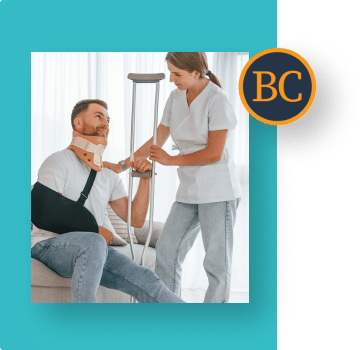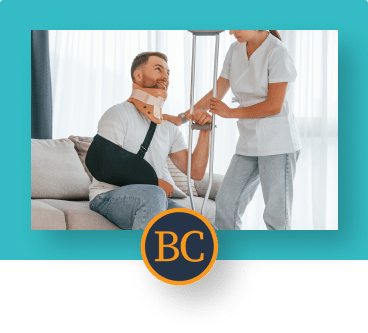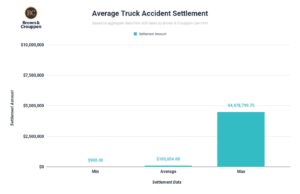Large commercial vehicles such as semis, 18-wheelers, and big box commercial vehicles cause some of the worst injuries we see here at Brown & Crouppen. Although federal regulations define a “large truck” as a truck greater than 10,000 pounds, a fully loaded semi can weigh up to 80,000 pounds. By contrast, even the largest passenger vehicles, such as pickups and SUVs, weigh less than 6000 pounds. With this sort of disparity, it is no surprise that most injuries and fatalities in truck accident cases are the passengers in a car, not the truck drivers themselves.
DETERMINING LIABILITY IN A SEMI-TRUCK ACCIDENT
Determining liability–in other words, figuring out who is at fault–is the first step a lawyer takes when evaluating a trucking accident. Sometimes, several parties may be at fault. An experienced personal injury attorney knows how to investigate the legal relationships between the driver and the trucking company, whether the tractor and the trailer are owned/controlled by separate entities, and investigate other potential parties.


Were you injured in an accident due to someone else’s negligence? Get legal help from the most effective injury law firm in the Midwest.
NEGLIGENT SEMI TRUCK DRIVERS & TRUCKING COMPANIES
Given the sheer size of commercial vehicles, it is no surprise that the industry is highly regulated. The U.S. Department of Transportation (DOT) and the Federal Motor Carrier Safety Administration (FMCSA) regulate the trucking industry in the United States. The safety regulations include the number of hours commercial drivers may drive and work and include safety restrictions such as mandatory rest breaks.
The FMCSA and DOT refer to these rules as the Hours of Service rules, and they are designed to minimize drowsiness and driver fatigue. Unfortunately, failure to comply with these rules is often the cause of truck accidents.
This may also apply to cases involving legal action against tow truck companies and other commercial trucks.
NEGLIGENT TRUCK DRIVERS
Truck drivers may be found negligent for a variety of negligent acts include the following:
- Speeding – Even though tractor-trailers can legally drive as fast as 70 miles per hour on our highways, many truckers routinely exceed the speed limit in delivering their cargo on time. Some trucking companies exert high-pressure tactics on their drivers to make on-time deliveries. Speeding increases the likelihood of an accident and leads to more severe injuries.
- Fatigue – Lack of sleep is the underlying cause of many serious injuries and even wrongful deaths.
- Distracted driving – Cell phones, other electronics, and other passengers in the truck can cause the driver to take their focus off of the road.
- Improper shouldering – When stopping on the shoulder of a highway for a reason other than a traffic stop, a truck driver must immediately turn on the trailer’s hazard warning signal flashers, and keep them on until all required warning devices (such as bi-directional emergency reflective triangles, red flags, fuses, and flares) on the traffic side of the road.
NEGLIGENT TRUCKING COMPANIES
Similar to negligent drivers, trucking companies may also be found liable for the accident, which can include the following acts of negligence:
- Pressuring drivers to ignore safety regulations – Truck drivers often report that their employers pressure them to drive in a hazardous manner in order to meet unrealistic deadlines for deliveries.
- Failing to inspect the trucks properly – Everything from bad brakes to balding tires can cause a truck to fail a safety inspection. Unfortunately, some trucking companies try to save money by shirking repairs (or worse–by falsifying safety records.) When trucking companies do this, they place their profits over the lives of their drivers and everyone else on the road.
- Hiring unqualified truck drivers – Over-the-road commercial truckers must carry a CDL, or Commercial Driver’s License. Obtaining a CDL takes time and work, so it is no surprise that CDL holders expect to be compensated for their experience. Some companies, however, try to save money by using drivers who lack a CDL.
LEGAL CONSIDERATIONS AFTER BEING HIT BY A SEMI
POLICY LIMITS
Commercial trucking insurance policies typically have limits between $750,000 and $1,000,000. Further, more than one insurance policy may cover the truck, the driver, and the cargo. With limits like that, it almost goes without saying that insurance companies already have attorneys. They had them before you were even hurt.
You need a lawyer, too. The evidence in a trucking accident can be vastly different from the evidence needed in an accident between passenger vehicles. Trucks, truckers, and trucking companies keep a wealth of documentation about their business practices. This might include dash cams, dispatch logs, phone records, and the vehicles themselves.
STATE LAWS
SETTLEMENT VS TRIAL
Depending on your case, you may choose to settle with the insurance company or pursue a trial in court. The average settlement amount for trucking accidents is approximately $73,109.92. However, this varies by case and is ultimately dependent on various case factors such as injury severity.
Cases that go to trial can have various outcomes and verdicts depending on evidence and overall strength of the case.
RECOVER COMPENSATION AFTER BEING HIT BY A SEMI TRUCK
The Kansas City and St. Louis truck accident attorneys at Brown & Crouppen know which evidence needs collecting. We know how to prove the extent of your injuries, lost wages, and emotional distress. Most importantly, we work for you and your loved ones— not the trucking company. Our law firm is dedicated to fighting for justice, and we have the track record to back it up with more than $1 billion won in personal injury cases.
If you or a loved one has been injured in a semi or truck accident, request a free case evaluation from a lawyer at Brown & Crouppen Law Firm. Since 1979, we’ve provided legal representation for those who have suffered injuries as a result of trucking accidents. Our law firm operates on a contingency basis, meaning that we don’t get paid unless you get paid. Request a free case evaluation by phone, chat, or tell us about your case online.






